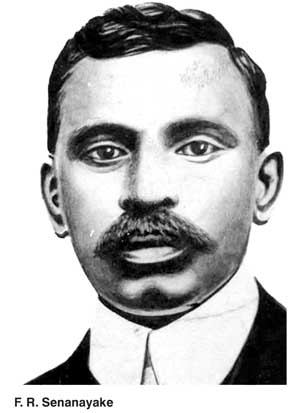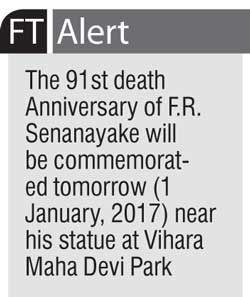Friday Feb 20, 2026
Friday Feb 20, 2026
Saturday, 31 December 2016 00:00 - - {{hitsCtrl.values.hits}}
By Sunil S. Sirisena
The objective of the British Imperialists, who in the course of their colonial expansion in the 18th century, captured and took full control of Sri Lanka (then Ceylon) in 1815, was to implant a system of administrative control of their choice with full powers to impose on the colonial people not only any type of administrative control but also a social and cultural regime that would reduce them to moral serfdom.
Collateral to such measures, they pursued other policies in the social sphere, aimed at alienating them from their traditional occupation of agriculture and devastating their educational and cultural infrastructure that had developed over time under the benign influence of the village temple. The white colonial masters took all possible steps to subjugate the local population into emulating their way of life by introducing into the village plantations, commercialised agriculture, missionary-dominated education and the offer of rewards and enticements by way of public offices to those seeking them and honorific titles to vainglorious aristocrats.
It was into such a social environment that baby Frederick Richard Senanayake was born on the 20 October, 1882 to his parents Don Spator Senanayake and Catherine Elizabeth Perera Gunasekara. He received his early education at an English medium school at Matale and later at S. Thomas College, Mount Lavinia. Thereafter, he proceeded to England and entered the University of Cambridge for higher studies.
Having secured a degree in law and thereafter qualified as a Barrister-at-Law, he returned to Sri Lanka and entered the professional arena as a lawyer. However, he was soon disenchanted with the legal profession and dedicated himself in earnest to his father’s business in the areas of plantation and
plumbago mining. He soon achieved immense success in his business ventures and consolidated his social position with a matrimonial alliance with another affluent family in the business world by marrying Alice Attygalle, the daughter of another business magnate.
With the social eminence thus achieved, he soon realised that he was now on the threshold of a position from which he could embark on a campaign of social reform to correct effects of the obnoxious colonial rule and to alleviate the painful results of the atrocities committed against Buddhism. He dedicated himself to this task both by personal endeavor and disbursement of funds to finance the activities.
He succeeded in setting up an organisation called the Temperance Movement to campaign against the excise ordinance which promoted the proliferation of taverns and liquor outlets which was a concealed device aimed at upsetting the social tranquility and the serene religious atmosphere. Enlightened educated youths wholeheartedly joined this movement.
With the cooperation extended by H.S. Olcott who had arrived in the island by this time, he succeeded in receiving the patronage of a number of leading Buddhist Bhikkhus and with their blessings, established the Buddhist Theosophical Society. He was invited to be its President in 1914 in recognition of his dedication, generosity and acclaimed leadership qualities.
This was not the only occasion which manifestly demonstrated his multi-facetted acumen. He actively participated in movements that campaigned for political reforms in association not only with his brothers, D.C. and D.S. Senanayake but also other national activists abnegating consideration of all affinities for race, religion and caste. As a reprisal for his forthright struggles against imperialist domination he was incarcerated together with other leaders under the Martial Law declared in consequence of the Sinhala – Muslim Riots of 1915. He was released in consequence of the representations made by other leaders such as Sir Ponnambalam Ramanathan and E.W. Perera. His munificence which enabled Sir D.B. Jayatilleke to acquire for the Colombo YMBA the land and premises at Borella which houses its headquarters is gratefully acknowledged by the Buddhist public.
He expended practically all his wealth towards the promotion of Buddhist education, formation of Buddhist associations and the establishment of Sinhala schools, sacrificing a life of indulgence and luxury which was easily at his command.
At the time he breathed his last, unexpectedly and fortuitously while on a pilgrimage in India, on 1 January, 1926. He had become a noble citizen who was universally acknowledged as an indispensable national figure.
This special issue of “The Buddhist” is a commemorative volume dedicated to pay our grateful tribute to a national hero who contributed towards the acquisition of this building – “Mahanil Nivasa” – which houses our headquarters and who served us as the Vice President of our association for a considerable period and departed at the relatively young age of 44 years.
I shall conclude this tribute of mine with a quotation from a speech delivered by Sir D.B. Jayatilleke, our first President, at a commemorative meeting held in honour of the late F.R. Senanayake:
“During the last thirty years I had the opportunity to associate with many citizens of Sri Lanka who played a leading role as national leaders. I can state unreservedly from my long association with him that there was no one who could be equalled to the late F.R. Senanayake in magnanimity and probity of character. This is clearly borne out by the fact that, during the past ten or twelve years there was no movement in this country whether national, social, political or religious in which Senanayake was not an active participant. Many projects that are accomplished realities today have never become what they are if not for his magnanimous philanthropy, public-mindedness, and selfless humanity. I know with certainty that he was their very foundation, power, vital force and protector. The void created by his departure from life can never be filled.”
May F.R. Senanayake attain the supreme bliss of Nirvana.
May all beings be well and happy.
(The writer Sunil Sirisena is the Editor of The Buddhist Magazine and is a Board Member of the Colombo YMBA. He was the Former Secretary, Ministry of Education and former Chairman, TRC Telecom Regulatory Commission.)